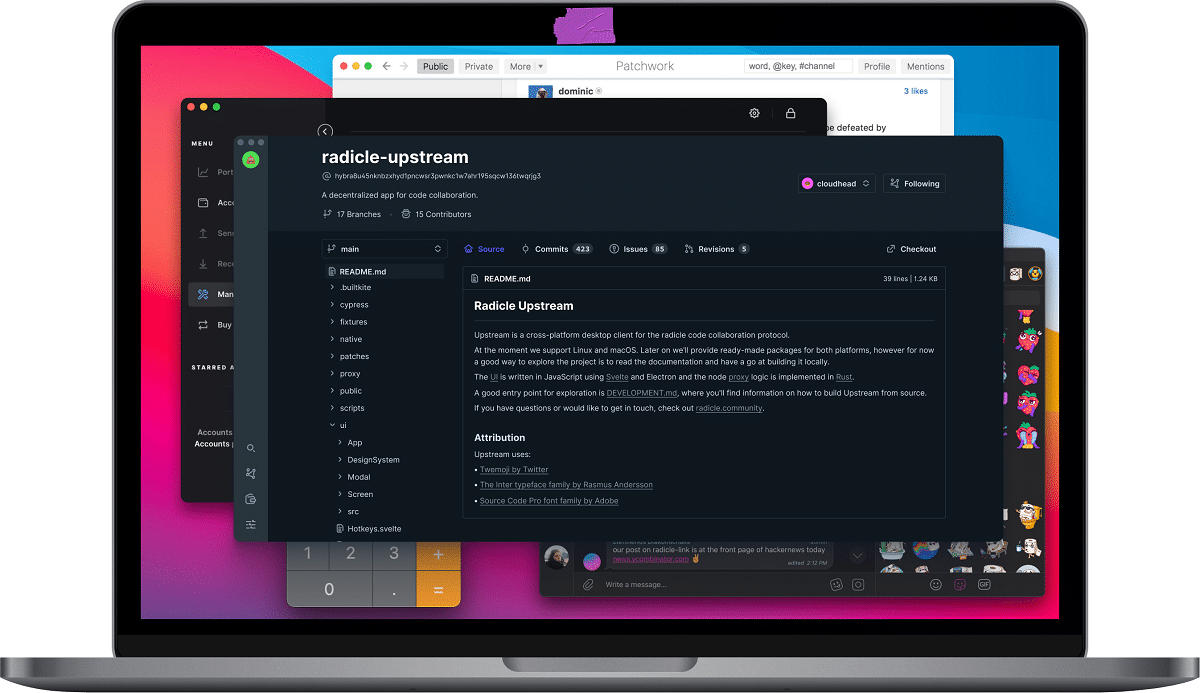
Radicle GitHub p2p
Today There are a large number of alternatives to GitHub, from open source alternatives, others that are specific to some projects (that is, private), others that are public, but leave much to be desired, among many others.
But listen to a P2P alternative to GitHub, if it's something you don't hear about every day And while browsing the web I came across Radicle, which presents itself as a decentralized code collaboration network, based on the familiarity of GitHub and GitLab as centralized repositories for code collaboration.
About Radicle
Radicle takes advantage of all the features of Git's version control system and adds decentralization, while integrating a series of Web3 identity features and as its website mentions » Unlike centralized code hosting platforms, there is no single entity that controls the network. Repositories are replicated peer-to-peer in a decentralized manner and users have full control of their data and workflow.
In Radicle You can start a Radicle project by cloning something stored in a Git repository. If you're already using Git but want to move away from one of the centralized repositories, the onboarding experience is quite seamless. The command line interface will be familiar to you. A key difference is that there is no single immutable master into which contributors are merged: each peer maintains a branched version of the project with the changes it is interested in maintaining.
The Radicle network protocol focuses on locating, replicating, and verifying repositories on a P2P code hosting network. Its decentralized approach guarantees access to repositories, regardless of their location or number of replicas. It uses a gossip protocol to exchange metadata between nodes, facilitating repository discovery and replication.
Radicle's architecture is local-first, ensuring continuous access to repositories directly from your device, regardless of internet connectivity. Repositories have unique identifiers and are self-certified, meaning that all actions, from committing code to adding a comment to an issue, are performed locally and are cryptographically signed, allowing peers to verify the authenticity and provenance of the data once propagated to the network. This allows trust to be established without depending on a centralized authority.
Most open source projects are usually hosted on GitHub or other alternatives such as GitLab, although they offer many benefits, they also have disadvantages, such as loss of control and privacy, as seen in the case of the deletion of the youtube-dl project. on GitHub. Radicle offers a decentralized approach that guarantees access to repositories regardless of their location or number of replicas.
Radicle works as a peer-to-peer protocol where each user runs identical software, known as the Radicle Stack. This stack includes a command-line interface and a network service called Radicle Node, which exchanges data via a gossip protocol to form a resilient network.
Among the latests Moravia's compositions Radicle q key featuresthat stand out, we can find the following:
- Ability to add multiple remote peers and manage them.
- Functionality to follow a project of a specific pair.
- It does not depend on central servers, which avoids censorship.
- Interconnection with other peers in a resilient and disruption-tolerant network.
- Ability to work offline and manage local problems and solutions.
- Integrated with Git for a simple and convenient development experience.
- Possibility of receiving financing through Ethereum and managing joint code bases.
Radicle is Designed to be an extensible platform that enables diverse use cases without the need for modifications at the protocol level. Although the initial release of Radicle focuses on code collaboration and publishing, a variety of other applications are anticipated in the future and possible today. These include knowledge sharing, project coordination, and collaboration on datasets, significantly expanding the reach and usefulness of the platform beyond code management.
How to install Radicle on Linux?
For those who are interested in using Radicle, you should know that there are different methods to install it on Linux and one of them is to install it by executing the following:
curl -sSf https://radicle.xyz/install | sh
Now, for those who are users of a Debian, Ubuntu or any derivative of these distros, you can install by typing:
sudo apt install curl
curl https://europe-west6-apt.pkg.dev/doc/repo-signing-key.gpg | sudo apt-key add -
echo deb https://europe-west6-apt.pkg.dev/projects/radicle-services radicle-cli main | sudo tee -a /etc/apt/sources.list.d/radicle-registry.list
sudo apt update
sudo apt install radicle-cli
To learn more about how Radicle works, you can consult the following link.
Technically... So if Nintendo prevailed, they would have to screw themselves because they couldn't sue anyone to have it removed? I'm talking about Yuzu. ;)